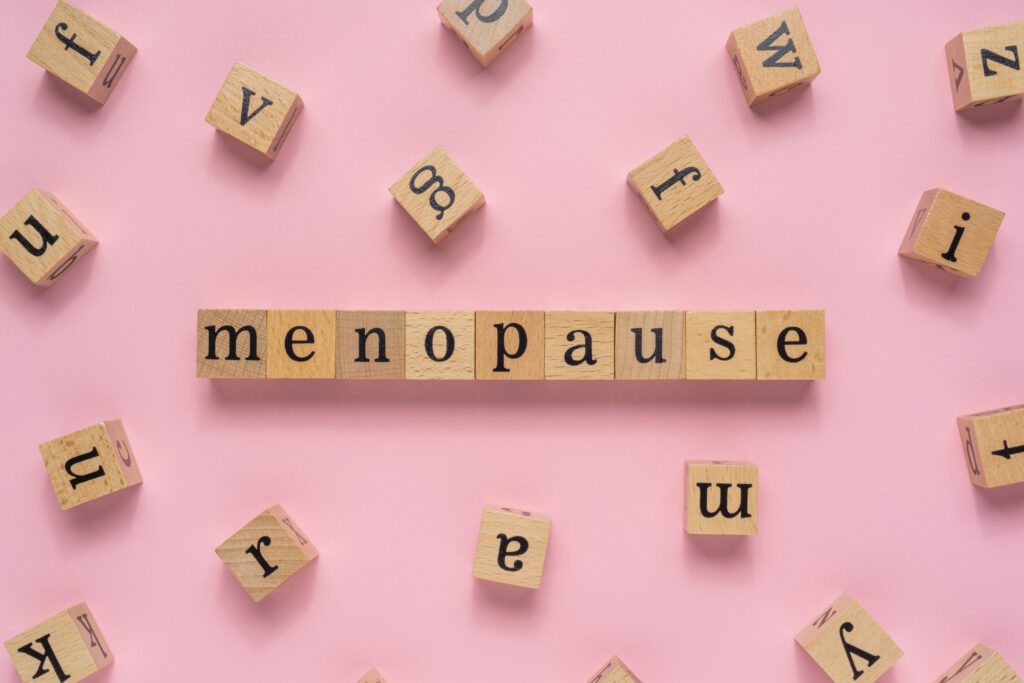Menopause is defined as when a woman has not menstruated for 12 consecutive months, meaning they can no longer become pregnant naturally. It typically occurs between the ages of 45 and 55 but may happen before or after this age.
Menopause can feel different for everyone, but many women experience a range of menopause symptoms that can be uncomfortable, upsetting or difficult to live with.
In this guide, we will explore what menopause is, why it happens, the signs and symptoms associated with menopause and possible treatments. In addition, we will also briefly look at other diseases that have a higher risk of developing at this stage of women’s lives.
Why does menopause happen?
Menopause is a natural process that happens as a woman ages.
During menopause, the ovaries start producing lower levels of hormones such as oestrogen, progesterone, testosterone, follicle-stimulating hormone (FSH) and luteinising hormone (LH). These changes in hormone levels trigger a number of changes in the body, such as your periods stopping, as well as other symptoms we associate with menopause.
Some women may experience menopause early as a result of treatment for other conditions. Treatments for cancer like chemotherapy and radiotherapy can cause early menopause, and surgeries such as hysterectomy can also cause menopause. Sometimes the reason is unknown.
The three stages of menopause
Understanding what to expect from menopause can help you to navigate the experience. There are three stages of menopause:
- Perimenopause – this is the name given to the phase where you have symptoms before your periods have stopped. This is typically experienced between four and eight years before menopause.
- Menopause – you reach menopause when you have not had a period for over 12 months.
- Postmenopause – at this final stage, periods have ended completely. However, symptoms of menopause may continue for as long as seven years
Each stage of menopause will have symptoms, and the severity of these symptoms will change from person to person.
Early signs of menopause
Typically, the first and most common signs of menopause that women will experience include:
- Irregular periods
- Vaginal dryness
- Hot flushes
The first sign of menopause is usually — though not always — a change in your periods. Your cycle may become irregular, and you may skip a month or more, or have a shorter cycle. You may also start having periods that are lighter or heavier than usual.
What are the symptoms of menopause?
Every woman is unique and will experience menopause in a different way. Some women will have very mild symptoms, while others will have severe symptoms which have a big impact on everyday life.
Here are some of the symptoms of menopause:
- Lowered frequency or irregular periods
- Lighter or heavier periods
- Night sweats
- Hot flushes
- Vaginal dryness
- Insomnia
- Weight gain
- Depression and anxiety
- Reduced sex drive
- Headaches
- Dry skin
During the postmenopausal period, women may experience the same symptoms as perimenopause. This can last for a number of years, and since the post-menopause stage is the stage that women will be in for the remainder of their lives, some symptoms may be permanent.
Often, menopause symptoms are more severe when menopause occurs suddenly or over a shorter period of time.
There are also some complications to be aware of when going through menopause. These can include loss of bone density, vulvovaginal atrophy, pain during sex and thinning of the walls of the vagina. It is also important to be aware of other health risks for women that can occur at this stage of life and get tested on time to reduce the risk of developing certain health diseases.
When does menopause start?
Menopause most commonly begins in women between the ages of 45 and 55, with the average age of menopause in the UK being 51.
Like with any condition or physical bodily change, menopause can occur at different times for different people, with some reaching menopause in their 40s and others not experiencing menopause until their 60s. In rare cases, women may even experience menopause as early as their mid to late 30s.
There is no way of knowing exactly when you will reach menopause but learning when family members went through the process can help give you an idea. In addition, you can get tested to determine if you are entering any of the stages of menopause.
How long does menopause last?
How long menopause lasts depends on a wide range of factors. This includes genetics, and how long it may have taken close family members to go through menopause.
On average, menopause lasts for around four years, though for some, it may last a lot longer.
What signals the end of menopause?
The ‘end of menopause’ is when you haven’t had a period for over a year. At this point, you have reached postmenopause.
As your hormone levels start to settle, you may experience fewer symptoms of menopause and symptoms can improve. Many women report experiencing higher energy levels, improved libido, better quality sleep and better focus.
However, there are some symptoms that you may still experience during this time, including vaginal dryness, lack of libido, hair thinning and insomnia.
You should consult your doctor if you are continuing to experience unpleasant symptoms, as there are a range of treatments available to help. They can also advise on what other health tests you should have as a woman to ensure that your body is in the best condition it can be.
Menopause treatments
Menopause symptoms can be treated through medication and lifestyle changes.
The most common treatment for perimenopause and menopause symptoms is hormone replacement therapy (HRT). HRT can replace the hormones that naturally lower during menopause. This can prevent or reduce the severity of many symptoms of menopause, including vaginal dryness, mood swings and loss of libido.
There are also things that women can do at home to help manage mild or moderate symptoms of menopause. These can include:
- Exercising regularly
- Eating a balanced diet
- Wearing loose, breathable materials to manage hot flushes
- Quitting smoking
- Reducing alcohol intake
- Taking supplements
It is best to check with your doctor before taking supplements or taking other at-home remedies to ensure they are best suited to you.
How to test for menopause
If you’re under 45 and have symptoms of menopause, your doctor may suggest that your FSH (follicle-stimulating hormone) levels are tested.
This level will be elevated during menopause, with a reading of 30 mIU/mL or higher, meaning that menopause has been reached. FSH can be tested for by your doctor using a simple blood test.
TSH (thyroid-stimulating hormone) may also be tested to ensure that your symptoms aren’t being caused by a thyroid issue rather than menopause.
Normally, your symptoms will be enough to identify whether menopause is occurring. If you want a test to be sure or to find out more about ways to manage your menopausal symptoms, get in touch with the friendly team at Echelon Health to talk to one of our experts.
Disease associated with the menopause
It’s important to establish a base line of where you are in the menopause cycle and with that identify any potential underlying health risks. This would help you detect them at their earliest stage. This was critically important for us at Echelon Health and that’s why we created the Cullinan Assessments, designed and built from the ground up for women.
Less than 2.5% of publicly funded research is currently devoted to the whole area of female health conditions, so tests, treatments or new medicines are not becoming available rapidly enough. In most cases women must manage their symptoms as best they can with whatever lifestyle changes, medicines and therapies are available to them.
There are some diseases that unfortunately have a higher risk of developing at this age, however among women they may get misdiagnosed due to the way women experience them. Women’s experience of various disease is different because:
- Women’s symptoms are often milder, they can arise later in the illness, and they can be unusual.
- Because heart disease in women often goes undetected, the damage caused can be more advanced and outcomes can be poorer than for men. Some tests used to diagnose heart disease are also less accurate in women than they are in men.
- Women may experience a heart attack with no symptoms of chest pain. They may experience nausea or vomiting, which are oftentimes confused with acid reflux or the flu.
- Clinicians believe that the decline in bone density and its complications solely affect postmenopausal women, which may create health disparities. However, osteoporosis and its complications affect both genders but at different ages and rates. Osteoporosis is four times more common in women than in men, but some evidence indicates that men tend to have more osteoporosis-related complications.
- Since the early 1970s, lung cancer mortality rates have decreased by almost a third (31%) in the UK. Rates in females have increased by more than three-quarters (77%), and rates in males have decreased by around three-fifths (59%) (2017-2019).
The Cullinan Assessment is dedicated to women who are 40 years old or above and is designed to detect signs of early disease associated with this stage of life, along with those diseases that are the leading causes of premature death in women – coronary heart disease, lung disease, breast cancer and ovarian cancer, and osteoporosis.
It doesn’t consider statistical analysis, but rather looks inside the body of the woman in incredible detail to determine confidently if there are any signs of early disease.
The Cullinan assessment is designed as a holistic experience, with body and soul in mind. In addition to the highly detailed health assessment, our clients benefit from a chauffeur-driven round-trip transfer within 100 miles of our Harley Street clinic and an overnight stay at one of London’s top 5* hotels, including a natural oil deep relaxation massage. The full list of what is included in this health assessment is as follows:
- Comprehensive bloods + Hormonal Profile + cancer markers
- Digital mammogram
- Transvaginal Ultrasound
- ECG
- CT Coronary angiogram
- CT Chest
- CT Bone Density
- Full Body Mole Check
- Round trip transfer in chauffeur driven car
- Overnight stay in one of London’s top 5* Hotels
If you would like more information about how the pre menopause/menopause can affect you or would like to have a consultation about the Cullinan Assessment please don’t hesitate to contact us!
Sources:
- https://www.ageuk.org.uk/information-advice/health-wellbeing/mind-body/6-things-to-know-about-the-menopause
- https://www.nhsinform.scot/healthy-living/womens-health/later-years-around-50-years-and-over/menopause-and-post-menopause-health/signs-and-symptoms
- https://www.mayoclinic.org/diseases-conditions/menopause/symptoms-causes/syc-20353397
- https://www.webmd.com/menopause/guide/menopause-symptoms-types
- https://www.healthline.com/health/menopause
- https://www.nhs.uk/conditions/menopause/symptoms/



